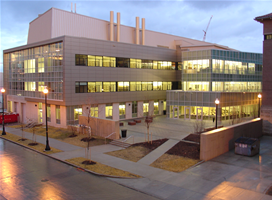Program Orientation
The Developmental Psychology Program considers fundamental questions in the field of psychology from the perspective of developmental change. The primary area of emphasis is cognitive development, including attention and memory, learning and conceptual development, language acquisition, reading development, mathematics development, and the interactions among these processes. Secondary areas of emphasis include social cognition, moral development, and parent-adolescent relationships. Faculty employ state-of-the-art experimental methods for studying cognition in infants and young children, for example preferential looking, habituation, EEG, fMRI, microgenetic approaches, quantitative and molecular genetics, as well as traditional experimental techniques and physiological measures. Students are encouraged to visit individual labs for more specific information about on-going research.
Program of Study
During their first two years, students take a series of core courses that prepare them intellectually and methodologically for the program. The intellectual core consists of Cognitive Development, Social Development, and Language Acquisition; the methods core consists of a multi-quarter statistics sequence and a specialized Developmental Methods course. Students are also expected to take more specialized courses that link to their research interests and inform the research for their master’s degree.
Students are expected to complete their master’s degree, including the master’s thesis, by the end of the first two years of study. At the end of the third year, students are admitted to Ph.D. candidacy after passing the Candidacy Examination. Questions for the Candidacy Examination are based on a reading list that is prepared with the help of the four faculty members who serve on an examination committee. An additional one to two years are typically spent completing the Ph.D. dissertation.
Areas of Emphasis
The primary area of emphasis is cognitive development, including attention and memory, learning and conceptual development, language acquisition, and the interactions among these processes. Secondary areas of emphasis include social cognition, moral development, and parent-adolescent relationships. Faculty employ state-of-the-art experimental methods for studying cognition in infants and young children, for example preferential looking, habituation, EEG, fMRI, microgenetic approaches, as well as traditional experimental techniques and physiological measures. Students are encouraged to visit individual labs for more specific information about on-going research.
Facilities
Faculty and graduate student offices are in the Psychology Building. The building contains on-site lab facilities for working with adults, infants and toddlers. In addition, students often go off-site to test children at preschools and at COSI (the Columbus science museum). Additional facilities for working with young children are available in the Cognitive Development Lab at the Center for Cognitive Science. The Center for Cognitive Science at Ohio State is a multi-disciplinary center having connections with Departments of psychology, philosophy, computer science, linguistics, optometry, industrial and systems engineering, and speech and hearing sciences, among others.
Financial Support
We try to guarantee graduate students admitted in the Developmental Program at least four years of support beginning with their first year in the program. This includes tuition, fees and a monthly stipend. The assistance is most often in the form of on-campus, departmental employment, such as research assistantships and teaching associateships. In some cases, this support may include one or more years of fellowship support.
Faculty
- John C. Gibbs
- John E. Opfer
- Stephen Petrill
- Zeynep Saygin
- Sarah Schoppe-Sullivan
- Vladimir M. Sloutsky
- Laura Wagner

